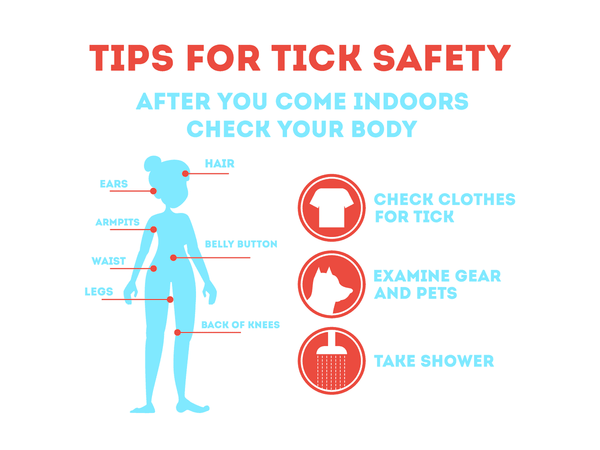Tick Check

Daily Tick Checks
Performing a daily tick check after you have been in any tick habitat is an essential and potentially lifesaving procedure. Tick checks can be done quickly and efficiently, and they are well worth the effort since most tick bites go totally unnoticed at the time of the incident.
You cannot feel a tick bite, at all, with very few exceptions. Being bitten by a tick is not like a mosquito bite, a bee sting, or a spider bite, it is quite the opposite. Ticks secrete a special substance that prevents you from feeling their bite, so they may remain attached to you unnoticed, feeding on your blood for as long as they like.
Anyone engaging in high risk for tick bite type outdoor activities should perform a tick check once you have exited the tick habitat. Tick checks are advised for anyone camping, fishing, hiking, backpacking, boating, lawnmowing,
How to do a tick check: (The proper technique for performing a tick check)
Get to a well-lit area, ideally a restroom with at least one mirror set on a wall. A secondary handheld mirror is also recommended.
First check all your clothing for ticks. Take off your clothing and set it aside. If you have been in area densely inhabited by ticks the clothing should be immediately washed with a hot water cycle.
Now run your fingers through your hair several times and use the mirror to look everywhere you can, every spot on your body. Angle the small handheld mirror and use it in conjunction with the fixed wall mirror to investigate hard to see spots on your body. Remember ticks love warm moist areas so every worst-case scenario location for where you might have a tick is also a high probability location for where you might have a tick.
The key to performing a thorough tick check is a combination of mirror utilization and checking your skin manually for any irregularity, run your hands across your skin to check for any variance or raised area.
Any little speck or bump needs to be investigated, use the handheld mirror, and get a closer look, ticks can be super small, less than the size of a poppy seed.
Make sure to perform a tick check each time you engage in outdoor activities that put you at risk for a tick bite. If you can locate a biting tick soon after it has attached to you, your chances of contracting a tick-borne disease are almost zero. Most sicknesses transmitted by ticks require a tick to be attached to you and feeding for 24 hours or more before an infection occurs. If you can spot the tick right away and remove the tick quickly your chances of falling ill are negligible.
#1. Do a tick check each time you have been at risk for a bite.
#2. Use an effective tick repellent to reduce the chances that you are bitten
